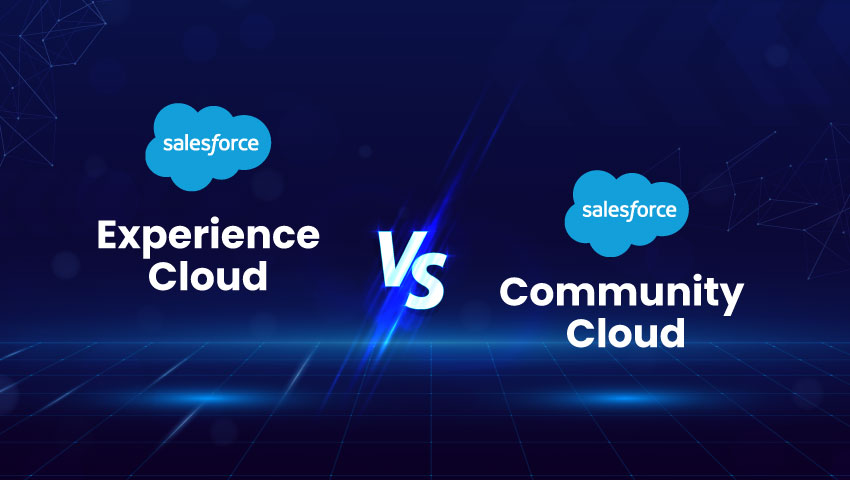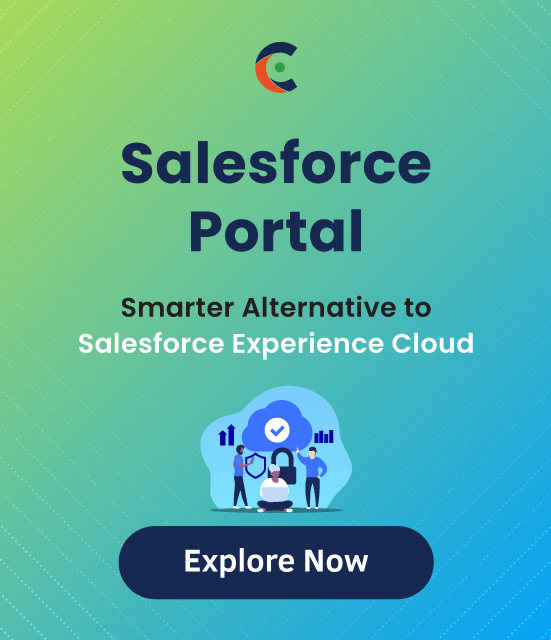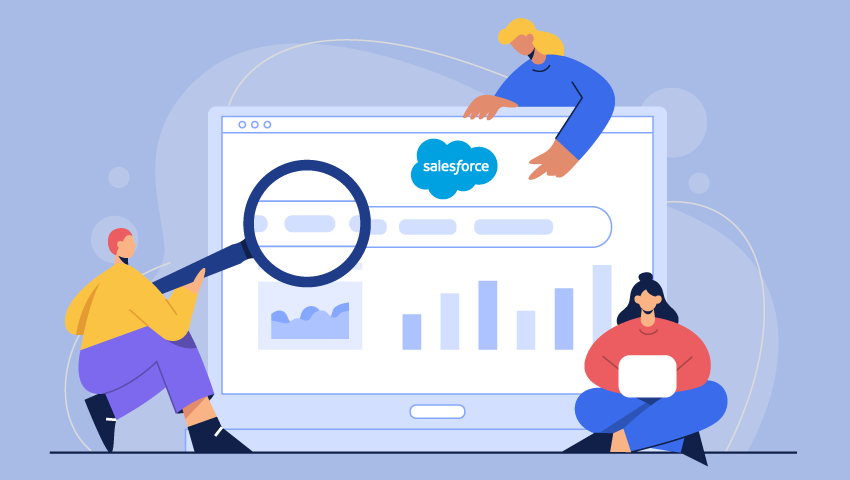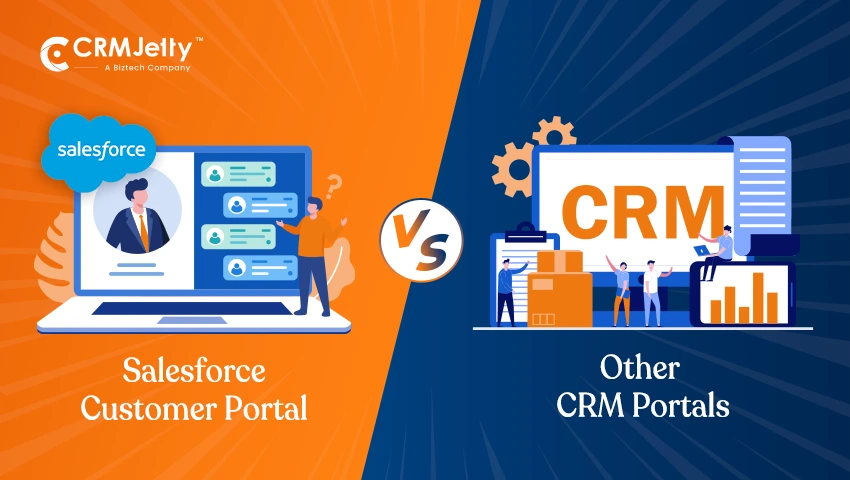Salesforce Experience Cloud and Salesforce Community Cloud are two different names for the same platform.
Salesforce rebranded Community Cloud as Experience Cloud in 2022 to better reflect its capabilities and features.
So, it is not Salesforce Experience Cloud vs Community Cloud, they are the same.
Experience Cloud lets businesses create and manage branded, personalized, and secure digital spaces for customers, partners, and employees to join, get involved, and work together.
It is more than a community platform; it is a digital experience platform that allows organizations to create brand loyalty by delivering fully immersive, interactive experiences to their stakeholders.
Features of Salesforce Experience Cloud
The key features of the Salesforce Experience Cloud include developing and managing the digital experiences of customers, partners, and employees. Some of the important ones are:
Experience Builder: An intuitive drag-and-drop tool that easily helps users design, create, and launch interactive digital experiences without a line of code. With this approach, users can now choose from templates, components, and themes to either design on their own or build and craft their own from scratch. It also comes with responsive design, the ability to do search engine optimization, and accessibility.
Engagement Metrics: Users have the ability to determine and measure business goals. They can use pre-configured as well as custom dashboards to access adoption, engagement, satisfaction, and revenue counts among other metrics. This way, they will actually be able to gain valuable insights and be in a position to take decisions, all targeting the optimization of their digital experience for effect and success.
Business Integration: Seamlessly integrate user’s digital experiences with data coming from any system, such as Salesforce or third-party sources or legacy systems. This serves to empower the user, helping him harmonize his digital experience with his current sources of data, towards providing streamlined and more engaging operation.
Personalization: With the help of this functionality, users may provide their audiences with relevant and customized experiences. AI allows users to automatically recommend activities, connections, and material based on their unique requirements, interests, and behaviors.
Customization and Branding: Using this feature, users may brand and personalize their digital experiences to represent who they are and what they stand for. Users can build visually appealing and branded experiences by using their logos, colors, fonts, and photos.
Knowledge: Users can give their partners and consumers self-service choices. Team can manage FAQs, articles, and other materials that assist their target audiences in finding solutions.
Case Escalation: This feature enables users to enhance client satisfaction and service. Customers and partners can open issues straight from their digital experiences with users, and cases can be automatically escalated based on time constraints or keywords. Additionally, users can respond to instances discreetly or within the digital experience.
Engagement: With the help of this tool, users can encourage a sense of loyalty and community among their viewers. Users can award their most active users badges, incentives, and endorsements. Users may also allow conversations, groups, and subjects for their viewers to engage with one another.
Ecommerce: Users may let their partners and customers find, investigate, and purchase things all in one location by integrating their e-commerce platform with their digital experiences.
Challenges While Using Salesforce Experience Cloud
Salesforce Experience Cloud is a powerful platform for creating and managing digital experiences, but it also comes with some challenges that businesses need to overcome. Some of the common challenges are:
Limited internal expertise and resources: A great deal of technical expertise is needed to install and operate Salesforce Experience Cloud efficiently. Companies might not have enough internal employees certified in Salesforce Experience Cloud or sufficient funding to engage outside partners or consultants. When the platform is implemented and maintained, this may cause mistakes, hold-ups, or less-than-ideal outcomes.
Migration: This is one of the tough and seemingly lengthy processes—moving data from e-commerce platforms, marketing automation platforms, CRM systems, etc.—from various sources to Salesforce Experience Cloud. Especially where data is huge, unorganized, or inconsistent it is important to ensure that there is no data loss and duplication of data. The mapped data should be accurately cleaned, validated, and mapped for the companies.
Integration and customization: Salesforce Experience Cloud enables a broad spectrum of flexibility. Hence, the company will need to shape this platform in a manner by which it delivers according to its own unique needs and preferences. This would involve extensive work such as coding, setting up, and testing of different elements, including workflows, themes, templates, and components. You will also need to integrate the platform with third-party or legacy sources to further the flow of data and functionality. These jobs can be difficult and call for a high level of coordination and technical know-how.
Adoption by the Users: Salesforce Experience Cloud sees improved utilization of the systems through higher involvement and adoption by the end-users, including partners, customers, and staff. The same depends also on how much and efficiently the aspect of people accepting and using the platform is done. The company will need to ensure training and support for users in the use of the platform, awareness of the capabilities, and the benefit the user draws from its use. The company will also need to follow up with user adoption and feedback, making the necessary adjustments and fine-tuning.
Quality, Security, and Integrity of Data: Salesforce Experience Cloud holds a lot of private and sensitive data, such as interactions, transactions, and data about the customer. So, companies must make sure that, apart from enforceable legislations and regulations, such data is stored securely and is of the highest possible quality and reliability. Companies must also guard against data breaches and leaks and prevent unauthorized access, modification, or deletion.
CRMJetty Salesforce Portal an Alternative of Salesforce Experience Cloud
CRMJetty Salesforce Portal is a third-party solution that allows businesses to create and manage web portals for their customers, partners, and employees using Salesforce data and functionality. CRMJetty Salesforce Portal is an alternative to Salesforce Experience Cloud, which is Salesforce’s own platform for creating digital experiences.
Some of the features of the CRMJetty Salesforce Portal are:
Real-time Configuration: Configure and customize their portals in real-time, without any coding or deployment. Change the layout, theme, logo, menu, and other elements of their portals with a few clicks.
Extensive Content Management: Create, edit, and manage content for their portals using a rich text editor. Users can also upload images, videos, documents, and other files to their portals.
Customizable Features: Add various features to their portals, such as login, registration, profile, dashboard, search, chat, feedback, and more. Users can also create custom modules and workflows for their portals using Salesforce objects and fields.
Device-Specific Layouts: Create different layouts for their portals based on the device type, such as desktop, tablet, or mobile. Optimize the user experience and performance of their portals on different devices.
Unlimited Templates: Choose from a wide range of templates for their portals, covering various use cases and industries. Create their own templates or modify the existing ones.
Integration with Third-party Apps: Integrate their portals with other apps and systems, such as Google Analytics, Mailchimp, Stripe, PayPal, and more. Enhance the functionality and usability of their portals with these integrations.
Some of the benefits of the CRMJetty Salesforce Portal over Salesforce Experience Cloud are:
Lower Cost: CRMJetty offers straightforward pricing, which helps businesses streamline their financial plans. Especially when they are in the growing and expanding phase.
More Customization: CRMJetty Salesforce Portal offers more customization options than Salesforce Experience Cloud, allowing users to create and modify their portals without any limitations or restrictions.
Better Support: CRMJetty Salesforce Portal offers dedicated account managers, technical experts, and customer service representatives for portal users. Users can also get free updates, bug fixes, and feature enhancements for their portals.
Compare Salesforce Experience Cloud with CRMJetty Salesforce Portal
| Feature | Salesforce Experience Cloud | CRMJetty Salesforce Portal |
|---|---|---|
| Cost | Charges per login or per member | Unlimited page views and logins |
| Customization | Has limitations and restrictions on customization | Offers more flexibility and control over customization |
| Support | Provides standard support for portal users | Provides dedicated and personalized support for portal users |
| Customizable Features | Not available | Available |
Conclusion
CRMJetty Salesforce Portal is a compelling alternative to Salesforce Experience Cloud, as it provides a user-friendly, scalable, and customizable platform for creating and managing web portals using Salesforce data and functionality. CRMJetty Salesforce Portal can help businesses improve their customer service, partner relations, and employee engagement with their portals. Reach out to us for a personalized demo.
All product and company names are trademarks™, registered® or copyright© trademarks of their respective holders. Use of them does not imply any affiliation with or endorsement by them.








